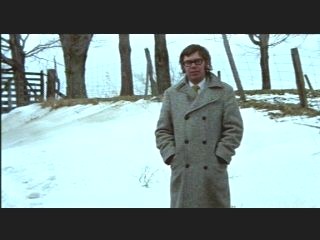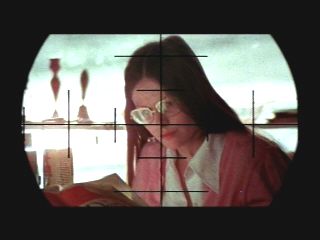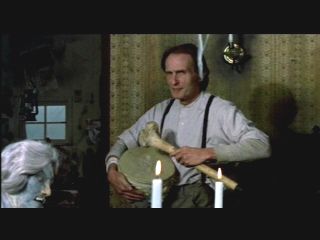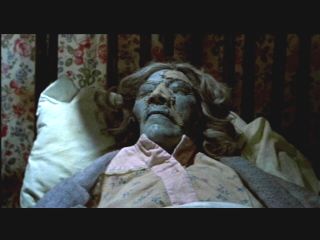
|
|
|
|
|
|
|
|
|
|
|
|
|
(1974) Director: Jeff Gillin & Alan
Ormsby
If you were to ask your average serial killer where he got his inspiration from, most likely he would shrug and mumble something about it coming naturally to him. He may not know it, but truth be told, he and other like-minded individuals owe a lot to Ed Gein. Gein wasn't the first serial killer, and (at least today) he isn't the most famous of his kind, but it was the way that he went around his business that accounts for not only how the typical person pictures a serial killer, but no doubt had a lot of influence on newcomers to the field like Jeffrey Dahmer. Many of you no doubt already know something about Gein
and his practices (for those that don't, you can read a brief but
informative biography here),
so the fact that Hollywood had their own kind of inspiration coming
from Gein and his activities probably won't need to be explained.
Though what is surprising is just what this particular inspiration
resulted in. Knowing the facts of the Gein case, and also knowing that
Gein and his practices were the butt of American schoolyard jokes for
years afterwards, one might
Oddly, even though Deranged was made to be an accurate recreation of Ed Gein and his activities, a written announcement at the beginning of the movie states that the names and places have been changed. While I can understand why the names of the other individuals involved in the case may have been changed, and even why the locations have been changed, I simply don't understand why the movie went a step further and changed the name of the central character to "Ezra Cobb". Did the producers somehow think that Gein, still alive and incarcerated at the time, would sue them for "misrepresentation" or something? Admittedly, we are dealing with some pretty hot stuff here, which the onscreen narrator (Carlson) quickly informs us, telling us we are about to see "...the story of Ezra Cobb. Murderer, grave robber, necrophiliac perhaps... the butcher of Woodside." We are then taken back to where it all started, meeting Cobb (Blossoms), a 37 year-old farmer who looks almost twice his age. For the past twelve years he has been taking care of his bedridden mother (Lee) all by himself in the isolated farmhouse. It's immediately clear that the isolation has made a big impact on his now fragile mental state, so when his mother suddenly dies in front of his eyes, it's inevitable that something should snap. At first it just seems that Cobb has developed one or two little kinks, illustrated when he digs up his mother's corpse after several months, then bones up on taxidermy so that he can preserve his mother's corpse, but maybe also to fulfill a twisted hope that this may resurrect his beloved parent. When his homemade applications fail to be acceptable, he gets the idea to return to the local cemetery to dig up recently-deceased townspeople and use their body parts to patch up his mother. From that point, it is perhaps inevitable that Cobb eventually stumbles across the idea of getting even fresher materials to work with, and though Woodside might be a small town, it doesn't prove difficult for him to find new victims to add to his growing collection of corpses. In making a movie like this, the most important thing
that needs to be done in order to help make the movie successful is to
create a convincing psychotic central character. Not just being
convincing in the screenplay - creating activities Ezra Cobb's mind soon becomes not the cinematic favorite kind of madness, where someone commits violent acts though simultaneous seems almost self-aware of their own insanity and seems to possess a (twisted) kind of logic to their thinking. Instead, Ezra Cobb is shown to be simply a sick man, one who has lost all touch with reality and can no longer reason. A mind that can commit such heinous acts with no hesitation or remorse is not only more realistic than your average ranting and raving movie lunatic, it is more genuinely frightening. But that's not all that is distressing concerning Cobb; what is almost equally uneasy to witness is how the other citizens of Woodside consider him. Even though the events were taking place in a time where public knowledge of abnormal mental heath and possible avenues of its treatment was far less extensive as it is today, you still have to wonder about the minds of Cobb's friends and neighbors. As the narrator tells us, Cobb was considered "eccentric"; none of them seem to find anything strange about Cobb gleefully enjoying himself on a child's swing, or that he has to be patiently taught about what an obituary section in a newspaper is about. It's creepy to see that the citizens of Woodside are seemingly blind to something so obviously wrong in front of their eyes... and it would be equally disturbing if we were to find out that they did suspect something wasn't right, but that they didn't want to get deeply involved. Of course, the behavior of these citizens would not be
so uneasy to watch if the horror they were seemingly oblivious to was
not so horrifying by itself. In this case, the character of Ezra Cobb
is indeed a scary figure, not just from the behavior he engages in, but
how actor Roberts Blossom It's not just Blossom and the acts his Ezra Cobb character commits that are chilling; there are many touches in the direction that give even the non-violent sequences an extra shiver to them. A co-production between the United States and Canada, Deranged was actually shot in the Ontario countryside, and it's one of the few times that a Canadian location has maybe worked to even better effects than if an American location had been used. Shot during the winter, the outdoors looks extremely cold and bleak, with seemingly nothing for miles but bare trees and snow - it would be surprising not to find a psychopath living in such emptiness. The exterior of the Cobb farmhouse looks eerily like the actual farmhouse Gein lived in, and the interior sets capture the filthy and garbage-strewn rooms that the pictures taken by Gein police investigators illustrate. Needless to say, there are also corpses amongst that garbage; though the corpses (famous makeup artist Tom Savini partially contributed to their construction) do have a paper maché-feeling to them, they still have a ghoulish quality to them that's effective. As for any other gory makeup effects being displayed, that actually is about it; the movie seems more content to scare with atmosphere and suggestion. In fact, by today's standards the movie would only need
a few small cuts in order to get a PG-13 rating. A bloody sequence
involving the removal of a brain was filmed but never included
in the theatrical Deranged is by no means not perfect; there are flaws here and there, such as the Carl Zittrer score, which though initially low-key and creepy, soon becomes tiresome with a few certain bars endlessly repeated. Other than a few such nitpicks, it's quite an effective achievement, especially when you consider that it was made for just $200,000, which was quite low even for 1974. The funny thing is that many of the best serial killer movies have been made with poverty-row budgets as well - the gritty feel and stark look turns out to be an advantage. With Deranged yet another movie to add onto that growing list, making a serial killer movie might be an excellent way for a first-time filmmaker to get attention. However, seeing all the negative results that came out of the creation of another unique low budget horror movie - The Blair Witch Project - I am almost tempted to advise these same filmmakers to make another stupid slasher movie instead. Check for availability on Amazon (DVD) Check Amazon for availability of Ed Gein biography See also: Confessions Of A Serial Killer, Psychopath, Skinner |
 think at
first that the movies inspired by all of this would be exploitive
and/or of a campy nature. Not so. Psycho and The
Texas Chainsaw Massacre, which both took elements of the Gein
case, are now both considered horror classics. A more accurate
re-enactment was done with the recent Ed Gein, a sober
and reasonably compelling effort containing a superb performance by
Steve Railsback. As good as that movie is, an even better accurate look
at Gein can be found in Deranged. Oddly,
despite the movie being extremely effective at recreating the real-life
events, this movie has barely registered on the radar since its
theatrical release; though it got released to video in the '90s, this
release was almost non-existent. Hopefully with it now being widely
available on DVD, it can finally find the audience it deserves.
think at
first that the movies inspired by all of this would be exploitive
and/or of a campy nature. Not so. Psycho and The
Texas Chainsaw Massacre, which both took elements of the Gein
case, are now both considered horror classics. A more accurate
re-enactment was done with the recent Ed Gein, a sober
and reasonably compelling effort containing a superb performance by
Steve Railsback. As good as that movie is, an even better accurate look
at Gein can be found in Deranged. Oddly,
despite the movie being extremely effective at recreating the real-life
events, this movie has barely registered on the radar since its
theatrical release; though it got released to video in the '90s, this
release was almost non-existent. Hopefully with it now being widely
available on DVD, it can finally find the audience it deserves. for the character that are believable as well
as frightening - but that an appropriate actor has been cast in the
central role who can convincingly act out these scenarios. Deranged
is fortunate enough to have both of these things at
its disposal. The main focus of the screenplay (written by co-director
Ormsby, who also scripted the cult horror movies Deathdream
and Cat People) is actually not on the horrific deeds
that Cobb ends up doing, but more of a look at his diseased mind. We
are shown the unhealthy environment that he had been dwelling in for
years, which undoubtedly played a big part in causing him to slowly
lose his sanity. We are shown that what subsequently pushed him deeper
and deeper into madness came not from an already weak mind becoming
weaker and weaker on its own, but that this weak mind of his was no
longer strong enough to think for its own. This is made clear by the
fact that every time Cobb is lowered another run in the pit of
insanity, it comes from an outside event. The death of his mother was
unquestionably an outside event that severely twisted him, but
seemingly innocent remarks by his neighbors or unexpected happenings
like suddenly finding himself in a frightening situation push him
further away from a mind with some sense of sanity into something that
runs by instinct - a particularly deadly kind of instinct.
for the character that are believable as well
as frightening - but that an appropriate actor has been cast in the
central role who can convincingly act out these scenarios. Deranged
is fortunate enough to have both of these things at
its disposal. The main focus of the screenplay (written by co-director
Ormsby, who also scripted the cult horror movies Deathdream
and Cat People) is actually not on the horrific deeds
that Cobb ends up doing, but more of a look at his diseased mind. We
are shown the unhealthy environment that he had been dwelling in for
years, which undoubtedly played a big part in causing him to slowly
lose his sanity. We are shown that what subsequently pushed him deeper
and deeper into madness came not from an already weak mind becoming
weaker and weaker on its own, but that this weak mind of his was no
longer strong enough to think for its own. This is made clear by the
fact that every time Cobb is lowered another run in the pit of
insanity, it comes from an outside event. The death of his mother was
unquestionably an outside event that severely twisted him, but
seemingly innocent remarks by his neighbors or unexpected happenings
like suddenly finding himself in a frightening situation push him
further away from a mind with some sense of sanity into something that
runs by instinct - a particularly deadly kind of instinct. depicts this behavior. He does a masterful job at underplaying
Cobb. Instead of being active with his tongue and body movement,
Blossom is content to hold back, sometimes so much so that his
character seems to be in some kind of daze or trance. This depiction
may not sound very effective described in writing, but seeing it
onscreen cannot help but make an immediate and big impact. Nobody of
his own mind in real life is this slow of mind and body; nobody you
know of perfect mental health seems so utterly and silently bewildered
by even the most trivial of things. Something is definitely not quite
right here... but what? Cobb keeps his feeling to himself most of the
time, but we can sense something volatile is brewing - and not just
knowing what malevolent force is hiding and waiting to overpower Cobb
at times of opportunity gets our imagination working, and we cannot
help but think (and feel) the worst is brewing in that diseased mind.
Occasionally we do get to see that evil suddenly breaking out of its
hiding place and overtake Cobb. In those moments, Cobb is suddenly
something different, like a man possessed, and it's a shock to see such
a quiet man suddenly committing such grisly acts. Blossom is not only
equally effective in these rampages, he makes the transition between
both sides of his personality with such seemingly effortless that it
feels natural. His work here is so effective that had Deranged been
a major studio movie with the proper promotion behind it, he very well
might have ended up with an Oscar nomination.
depicts this behavior. He does a masterful job at underplaying
Cobb. Instead of being active with his tongue and body movement,
Blossom is content to hold back, sometimes so much so that his
character seems to be in some kind of daze or trance. This depiction
may not sound very effective described in writing, but seeing it
onscreen cannot help but make an immediate and big impact. Nobody of
his own mind in real life is this slow of mind and body; nobody you
know of perfect mental health seems so utterly and silently bewildered
by even the most trivial of things. Something is definitely not quite
right here... but what? Cobb keeps his feeling to himself most of the
time, but we can sense something volatile is brewing - and not just
knowing what malevolent force is hiding and waiting to overpower Cobb
at times of opportunity gets our imagination working, and we cannot
help but think (and feel) the worst is brewing in that diseased mind.
Occasionally we do get to see that evil suddenly breaking out of its
hiding place and overtake Cobb. In those moments, Cobb is suddenly
something different, like a man possessed, and it's a shock to see such
a quiet man suddenly committing such grisly acts. Blossom is not only
equally effective in these rampages, he makes the transition between
both sides of his personality with such seemingly effortless that it
feels natural. His work here is so effective that had Deranged been
a major studio movie with the proper promotion behind it, he very well
might have ended up with an Oscar nomination. cut, and there was some grumbling from some people that
the sequence was not restored for the DVD release. Actually, I didn't
miss the sequence at all; the movie flows smoothly without it, and I
think a sudden sequence of extreme gore would not only come across at
gratuitous, but it would jar badly with the movie's otherwise subtle
tone. One other objection some viewers of Deranged have
voiced is with the use of the onscreen narrator. Not for his appearance
at the beginning of the movie when he tells us what we are about to
see, but in the way he pops up several times during the first half of
the movie, standing and talking to us just a few feet from Cobb at the
beginning of a scene before he stops and the camera subsequently moves
onto Cobb and his activities. This intrusion didn't bother me, mainly
since the narrator remains sober in his words and tone. I also thought
it was a nice change of pace from the often-used off-screen narrator
device. This is not the only change of pace the movie takes from
following the path of your typical docudrama. One other thing that has
been added is a sense of humor. No, not obvious and in-your-face gags
that have been forced into the narrative, but humor that comes out of
the absurdity of a particular event - whether it is someone trying to
explain something seemingly simple to Cobb, or even a crazy action Cobb
makes during a murderous rampage. These humorous touches are not only
amusing, sometimes they make a sequence seem even more convincing than
if it had been played completely straight; after all, something darkly
humorous can often come up even in the worst of situations.
cut, and there was some grumbling from some people that
the sequence was not restored for the DVD release. Actually, I didn't
miss the sequence at all; the movie flows smoothly without it, and I
think a sudden sequence of extreme gore would not only come across at
gratuitous, but it would jar badly with the movie's otherwise subtle
tone. One other objection some viewers of Deranged have
voiced is with the use of the onscreen narrator. Not for his appearance
at the beginning of the movie when he tells us what we are about to
see, but in the way he pops up several times during the first half of
the movie, standing and talking to us just a few feet from Cobb at the
beginning of a scene before he stops and the camera subsequently moves
onto Cobb and his activities. This intrusion didn't bother me, mainly
since the narrator remains sober in his words and tone. I also thought
it was a nice change of pace from the often-used off-screen narrator
device. This is not the only change of pace the movie takes from
following the path of your typical docudrama. One other thing that has
been added is a sense of humor. No, not obvious and in-your-face gags
that have been forced into the narrative, but humor that comes out of
the absurdity of a particular event - whether it is someone trying to
explain something seemingly simple to Cobb, or even a crazy action Cobb
makes during a murderous rampage. These humorous touches are not only
amusing, sometimes they make a sequence seem even more convincing than
if it had been played completely straight; after all, something darkly
humorous can often come up even in the worst of situations.